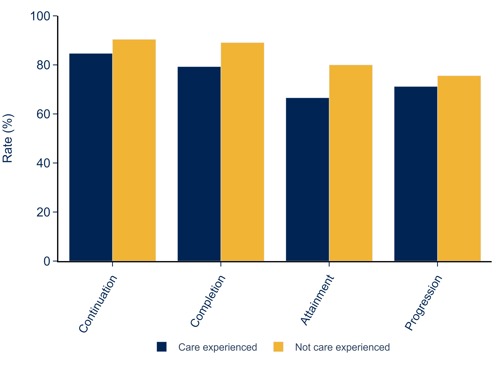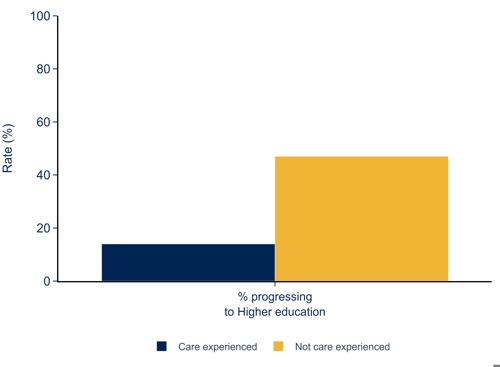Care experienced students
This refers to students with experience of care, defined in different ways.
Definitions of care experienced students vary.
Studies using UCAS data have a broad definition that accounts for formal and informal experience of care: UCAS define a care experienced student as someone who has:
‘spent time living with foster carers under local authority care, in residential care (e.g. a children’s home), looked after at home under a supervision order, or in kinship care with relatives or friends, either officially (e.g. a special guardianship order) or informally without local authority support’.
However, other studies that use Department for Education or local authority data, use formal definitions defined in acts of parliament. These vary according to the study, and include:
- ‘Care leaver’: includes any of the below:
- ‘eligible children’: aged 16-17, looked after by the local authority for 14 weeks starting before the age of 14
- ‘relevant children’: not looked after, aged 16-17, and has previously been an eligible child (but may also be a child that was detained before the age of 16)
- ‘former relevant children’: aged 18 or over, and had been a relevant child before the age of 18.
- 'Qualifying young people’: aged 21 or under who spent at least one day in fostered care while over the age of 16.
Key statistics
Key Stage 4 GCSE attainment:
Department for Education, ‘Key stage 4 performance, Academic year 2022/23’ October 2023.
Access to higher education:
Department for Education, ‘Widening Participation in Higher Education’ publication July 2023.
Continuation – Progression:
The Education and Skills Funding Agency’s (ESFA’s) individualised learner record (ILR), The Student Return, collected by the Designated Data Body (DDB) and The Student Alternative (SA) record, collected by the Designated Data Body (DDB).
On a provider level:
UCAS provides information on care experienced student status. It can be matched to Individual Learner Records by a provider for internal database purposes.
On a national level:
The student characteristics data: Outcomes data dashboard has information on the profile, continuation, completion, attainment and progression rates of care experienced students.
The National Student Survey data: student characteristics data has information on the experience of care experienced students.
Note: Definitions and the quality of each study vary.
‘A Briefing from the Alliance for Children in Care and Care Leavers: Children and Social Work Bill, Committee Stage’. Alliance-Briefing-CSWB-Commons-Committee-Stage-Mental-Health-Assessments.pdf (Accessed 11 December 2023) (tactcare.org.uk)
Baker, Zoe (2022) ‘The Care-Experienced Graduates' Decision-Making, Choices and Destinations Project: Phase one report’. Report. University of York
Cameron, C., Jackson, S., Hauari, H., & Hollingworth, K. 2012. ’Continuing educational participation among children in care in five countries: Some issues of social class’. Journal of Education Policy. Advance online publication. doi: dx.doi.or g/10.1080/02680939.2011.644811
Cotton, D.R., Nash, T. and Kneale, P., (2017). ‘Supporting the retention of non-traditional students in Higher Education using a resilience framework’. European Educational Research Journal, 16(1), (pp.62-79)
Cotton, Debby R. E.; Nash, Patricia; Kneale, Pauline E. (2014). ‘The Experience of Care leavers in UK Higher Education, Widening Participation and Lifelong Learning’, Volume 16, Number 3, 1 October 2014, pp. 5-21(17;
Department for Education (2016), ‘Outcomes for children looked after’, 2016 (Accessed 11/12/2023)
Department for Education, ‘Statistics: looked-after children’ (2023).(Accessed 11/12/2023)
Department for Education (2016), ‘Outcomes for children looked after by LA: 31 March 2016’ (Accessed 13/12/2023)
Department for Education (2023) ‘Widening participation in higher education, Academic year 2021/22 – Explore education statistics’.(Accessed 12/12/2023)
Department for Education and Department of Health (2015), ‘Promoting the health and well-being of looked-after children – Statutory guidance for Local Authorities, clinical commissioning groups and NHS England’, 2015
Harrison N. (2007) ‘Moving on up: Pathways of care leavers and care-experienced students into and through higher education’
Harrison, N. (2017) ‘Moving on up. National Network for the Education of Care Leavers’
Hauari, H. Hollingworth, K., Cameron, C (2019) ‘Getting it right for care experienced students in higher education’. UCL.
HEPI (2023) ‘Student Academic Experience Survey 2023’. HEPI. (Accessed 12/12/2023)
K Ellis, C Johnston (2019) ‘Pathways to University from Care: Findings Report One’. DOI: 10.15131/shef.data.9578930) Pathways findings report (1).pdf
London School of Economics (2021): ‘Journeys into higher education and employment: The impact of covid-19 on young people’.
Office for Students (2022) ‘Insight brief 13: Schools, attainment and the role of higher education’. (Accessed 11/12/2023)
‘Outcomes for children in need, including children looked after by local authorities in England’, Reporting year 2021 – Explore education statistics – GOV.UK. (Accessed 13/12/2023)
Sebba, J., Berridge, D., Luke, N., Fletcher, J., Bell, K., Strand, S., O’Higgins, A. (2015). ‘The educational progress of looked after children in England: Linking care and educational data’. Oxford/Bristol: Rees Centre and University of Bristol
TASO (2023) ‘Rapid review to support development of the Equality of Opportunity Risk Register’. (Accessed 12/01/2024)
UCAS ‘Next Steps: What is the experience of students from a care background in education?’ (Accessed 05/12/2023)
Welbourne, P. and C. Leeson (2012) ‘The education of children in care: a research review’, Journal of Children’s Services, 7(2), 128-143;
What Works for Children and Social Care (2020), ‘Care experienced people and higher education’. (Accessed 14/12/2023)
Describe your experience of using this website


